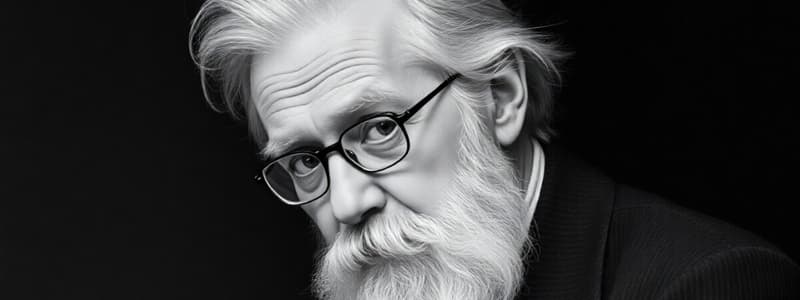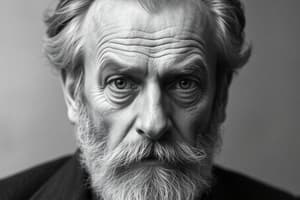Podcast
Questions and Answers
¿Cuál es el enfoque principal de la metodología de Husserl en su análisis de la conciencia?
¿Cuál es el enfoque principal de la metodología de Husserl en su análisis de la conciencia?
- Examinar la experiencia vivida y su conexión con el cuerpo
- Describir la esencia de la conciencia de manera descriptiva y libre de supuestos (correct)
- Explorar la relación entre la conciencia y el mundo como un todo
- Integrar la perspectiva del cuerpo en la fenomenología
¿Qué aspecto de la conciencia enfatiza Merleau-Ponty en contraste con Husserl?
¿Qué aspecto de la conciencia enfatiza Merleau-Ponty en contraste con Husserl?
- La desconexión entre la conciencia y la experiencia corporal
- El análisis abstracto de la conciencia
- La búsqueda de una descripción objetiva de la conciencia
- La experiencia vivida y su interconexión con el cuerpo y el mundo (correct)
¿Cómo se relaciona la obra de Merleau-Ponty con la de Husserl?
¿Cómo se relaciona la obra de Merleau-Ponty con la de Husserl?
- Merleau-Ponty adapta y amplía el enfoque fenomenológico de Husserl, especialmente sobre el cuerpo (correct)
- Merleau-Ponty sostiene que la conciencia puede comprenderse en aislamiento
- Merleau-Ponty se aleja completamente de las ideas de Husserl sin influencia alguna
- Merleau-Ponty aplica un enfoque puramente abstracto al estudio de la conciencia
¿Cuál de las siguientes afirmaciones refleja correctamente la metodología de Merleau-Ponty?
¿Cuál de las siguientes afirmaciones refleja correctamente la metodología de Merleau-Ponty?
¿Qué influencia significativa tiene el trabajo de Merleau-Ponty en la filosofía continental posterior?
¿Qué influencia significativa tiene el trabajo de Merleau-Ponty en la filosofía continental posterior?
¿Cuál es el objetivo principal de la metodología fenomenológica según Husserl?
¿Cuál es el objetivo principal de la metodología fenomenológica según Husserl?
¿Qué significa el término 'epoché' en la filosofía de Husserl?
¿Qué significa el término 'epoché' en la filosofía de Husserl?
¿Cuál de las siguientes afirmaciones describe mejor la 'intencionalidad' en la fenomenología?
¿Cuál de las siguientes afirmaciones describe mejor la 'intencionalidad' en la fenomenología?
¿Qué concepto introduce Merleau-Ponty en su enfoque fenomenológico que difiere de Husserl?
¿Qué concepto introduce Merleau-Ponty en su enfoque fenomenológico que difiere de Husserl?
¿Cuál es un elemento clave en el enfoque de Merleau-Ponty sobre la conciencia?
¿Cuál es un elemento clave en el enfoque de Merleau-Ponty sobre la conciencia?
¿Qué significa 'noema' en la fenomenología según Husserl?
¿Qué significa 'noema' en la fenomenología según Husserl?
¿Qué característica define la 'embodiment' en la perspectiva de Merleau-Ponty?
¿Qué característica define la 'embodiment' en la perspectiva de Merleau-Ponty?
¿Cuál es la diferencia principal entre las metodologías de Husserl y Merleau-Ponty?
¿Cuál es la diferencia principal entre las metodologías de Husserl y Merleau-Ponty?
Study Notes
Edmund Husserl and Phenomenology
- Husserl is considered the founder of phenomenology.
- Phenomenology is a philosophical approach that emphasizes the study of consciousness and experience.
- Husserl aimed to develop a rigorous method for studying consciousness, focusing on the essences of phenomena as they appear to consciousness.
- He believed in the importance of bracketing out prior assumptions and prejudices (epoché) to achieve a pure understanding of consciousness.
- Husserl's phenomenological method involves describing phenomena as they present themselves to consciousness without resorting to theoretical assumptions.
- Key concepts in Husserl's phenomenology include:
- Intentionality: Consciousness is always directed towards an object or a meaning.
- Noema: The meaning or content of an experience.
- Noesis: The act of consciousness.
- Phenomenological reduction (epoché): Setting aside assumptions about the world's existence beyond our awareness.
- Husserl's work significantly influenced subsequent philosophical development, particularly in existentialism and continental philosophy.
- He sought to establish a rigorous science of consciousness free from pre-conceived ideas.
- He explored a profound system for understanding consciousness and its grasp on the world around it.
Maurice Merleau-Ponty and Phenomenology
- Merleau-Ponty was a major figure in phenomenology, drawing inspiration from Husserl but developing a distinct approach.
- Merleau-Ponty emphasized the embodied and situated nature of consciousness.
- He argued that consciousness is not a disembodied, detached entity but is inherently tied to the body and its experiences in the world.
- Unlike Husserl's emphasis on a pure, detached consciousness, Merleau-Ponty stressed the lived experience and the role of embodiment in consciousness.
- Merleau-Ponty believed that perception is not a passive reception of data but an active engagement with the world.
- His phenomenological approach involved examining how the body interacts with the environment to generate meaning and understanding.
- Key concepts in Merleau-Ponty's phenomenology include:
- Embodiment: The inextricable link between consciousness and the body.
- Interdependency: The relationship between the body and the world; that the body both experiences the world and reacts to it.
- Dasein: A key concept, referring to human existence in the world, in which the individual is always active in the world.
- Perception as a form of knowledge of the world: Perception is not just a passively accumulating collection of data, rather it is an engagement and interacting with the world.
- Merleau-Ponty's work offered a new understanding of the relationship between consciousness and the world around it, arguing it can not be understood in isolation.
- He emphasized the importance of lived experience and the role of the body in shaping knowledge and understanding.
Differences between Husserl and Merleau-Ponty
- Husserl focused on the essence of consciousness, aiming for a purely descriptive analysis free of assumptions.
- Merleau-Ponty emphasized the lived experience of consciousness, arguing that consciousness is inextricably connected to the body and the world.
- Husserl stressed the distinction between consciousness and the world, aiming to establish a pure description of the former.
- Merleau-Ponty highlighted the interconnectedness of consciousness and the world, arguing that one cannot be understood without the other.
- Husserl's methodology prioritized a radical reduction of all assumptions, leading to a more abstract focus on consciousness.
- Merleau-Ponty's approach integrated his own unique perspective on the body and its essential connection with the world.
Relationship between both authors
- Merleau-Ponty's phenomenological work drew upon and adapted Husserl's approach, yet diverged from it significantly, particularly regarding the role of the body in consciousness.
- Merleau-Ponty's work represents a development and expansion of Husserl's phenomenology, rather than a complete departure.
- Merleau-Ponty's phenomenology, in turn, strongly influenced subsequent continental philosophy and its interpretations of consciousness, perception, and the human condition.
Studying That Suits You
Use AI to generate personalized quizzes and flashcards to suit your learning preferences.




